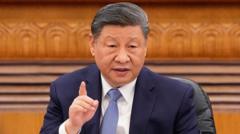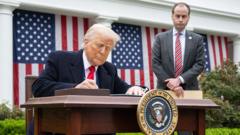Prosecutors are open to deferring Donald Trump’s sentencing on criminal charges until he finishes his presidential term, raising questions about the implications of his conviction in light of his impending inauguration.
Trump's Sentencing Delayed Amid Presidential Transition

Trump's Sentencing Delayed Amid Presidential Transition
Prosecutors consider postponing sentencing for Trump until after his term ends, highlighting constitutional debates.
In New York, the Manhattan district attorney's office has proposed delaying sentencing for President-elect Donald Trump until he completes his term in the White House, which is scheduled to end in 2029. While prosecutors vehemently oppose Trump's efforts to overturn his criminal conviction, they acknowledge the complexity of the situation and request the presiding judge, Justice Juan Merchan, to consider options beyond dismissal of the case. They have asked for a new deadline of December 9 for further motions and deliberations.
Trump, who was found guilty in May on 34 counts of falsifying business records related to a hush-money scheme during his 2016 campaign, is currently slated for sentencing on November 26. However, the judge may agree to postpone this date, following the arguments presented by prosecutors regarding presidential immunity and the timing of the case relative to Trump's duties.
Legally, since the U.S. Supreme Court ruled that presidents are afforded certain immunity regarding their official actions, Trump's lawyers are adamant that this should influence the court's handling of the conviction. Nonetheless, prosecutors maintain that the charges stem from activities unrelated to official presidential duties and are critical of the potential implications on justice if the president-elect remains unpunished.
Legal experts speculate that the request from the district attorney's office might lead to the likelihood of Trump's sentencing being significantly postponed. Former Manhattan prosecutor Diana Florence suggested there’s a minimal chance Trump will face sentencing next week due to the considerations the judge must navigate.
As the situation evolves with Trump's inauguration just days away, his attorney has expressed confidence in a resolution that would favor the president-elect. Meanwhile, concerns linger about the precedent set in this unprecedented scenario involving a sitting president facing criminal charges.
The outcome remains uncertain as both parties await Justice Merchan's decision, while observers from legal and political realms speculate on how Trump's unique position could alter conventional legal processes.
Madeline Halpert also contributed to this report, raising further inquiries about the implications of Trump’s ongoing legal struggles and their potential resolutions in the coming months.
Trump, who was found guilty in May on 34 counts of falsifying business records related to a hush-money scheme during his 2016 campaign, is currently slated for sentencing on November 26. However, the judge may agree to postpone this date, following the arguments presented by prosecutors regarding presidential immunity and the timing of the case relative to Trump's duties.
Legally, since the U.S. Supreme Court ruled that presidents are afforded certain immunity regarding their official actions, Trump's lawyers are adamant that this should influence the court's handling of the conviction. Nonetheless, prosecutors maintain that the charges stem from activities unrelated to official presidential duties and are critical of the potential implications on justice if the president-elect remains unpunished.
Legal experts speculate that the request from the district attorney's office might lead to the likelihood of Trump's sentencing being significantly postponed. Former Manhattan prosecutor Diana Florence suggested there’s a minimal chance Trump will face sentencing next week due to the considerations the judge must navigate.
As the situation evolves with Trump's inauguration just days away, his attorney has expressed confidence in a resolution that would favor the president-elect. Meanwhile, concerns linger about the precedent set in this unprecedented scenario involving a sitting president facing criminal charges.
The outcome remains uncertain as both parties await Justice Merchan's decision, while observers from legal and political realms speculate on how Trump's unique position could alter conventional legal processes.
Madeline Halpert also contributed to this report, raising further inquiries about the implications of Trump’s ongoing legal struggles and their potential resolutions in the coming months.





















